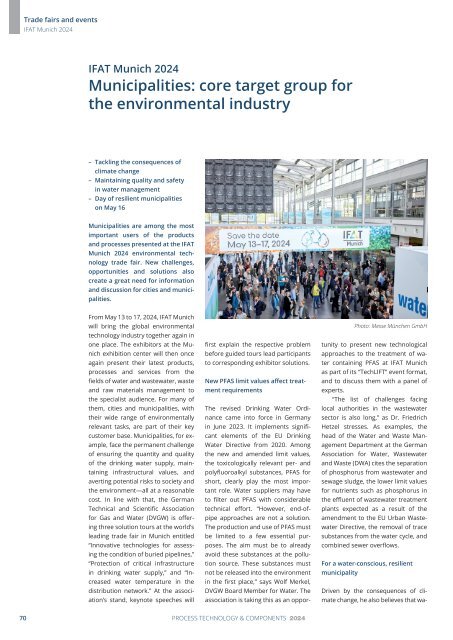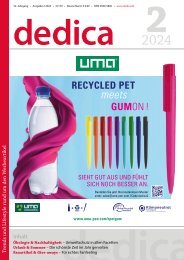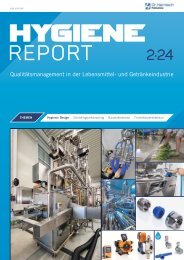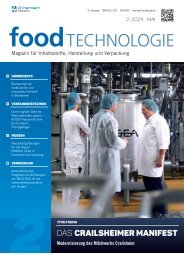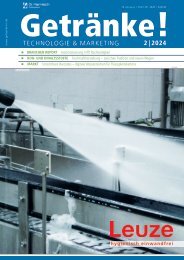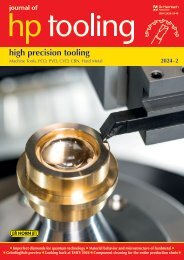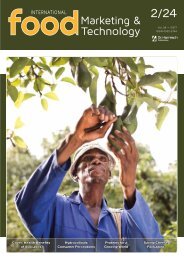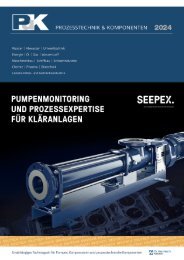PuK - Process Technology & Components 2024
A technical trade magazine with a history of more than 60 years.
A technical trade magazine with a history of more than 60 years.
Create successful ePaper yourself
Turn your PDF publications into a flip-book with our unique Google optimized e-Paper software.
Trade fairs and events<br />
IFAT Munich <strong>2024</strong><br />
IFAT Munich <strong>2024</strong><br />
Municipalities: core target group for<br />
the environmental industry<br />
– Tackling the consequences of<br />
climate change<br />
– Maintaining quality and safety<br />
in water management<br />
– Day of resilient municipalities<br />
on May 16<br />
Municipalities are among the most<br />
important users of the products<br />
and processes presented at the IFAT<br />
Munich <strong>2024</strong> environmental technology<br />
trade fair. New challenges,<br />
opportunities and solutions also<br />
create a great need for information<br />
and discussion for cities and municipalities.<br />
From May 13 to 17, <strong>2024</strong>, IFAT Munich<br />
will bring the global environmental<br />
technology industry together again in<br />
one place. The exhibitors at the Munich<br />
exhibition center will then once<br />
again present their latest products,<br />
processes and services from the<br />
fields of water and wastewater, waste<br />
and raw materials management to<br />
the specialist audience. For many of<br />
them, cities and municipalities, with<br />
their wide range of environmentally<br />
relevant tasks, are part of their key<br />
customer base. Municipalities, for example,<br />
face the permanent challenge<br />
of ensuring the quantity and quality<br />
of the drinking water supply, maintaining<br />
infrastructural values, and<br />
averting potential risks to society and<br />
the environment—all at a reason able<br />
cost. In line with that, the German<br />
Technical and Scientific Association<br />
for Gas and Water (DVGW) is offering<br />
three solution tours at the world’s<br />
leading trade fair in Munich entitled<br />
“Innovative technologies for assessing<br />
the condition of buried pipelines,”<br />
“Protection of critical infrastructure<br />
in drinking water supply,” and “Increased<br />
water temperature in the<br />
distribution network.” At the association’s<br />
stand, keynote speeches will<br />
first explain the respective problem<br />
before guided tours lead participants<br />
to corresponding exhibitor solutions.<br />
New PFAS limit values affect treatment<br />
requirements<br />
The revised Drinking Water Ordinance<br />
came into force in Germany<br />
in June 2023. It implements significant<br />
elements of the EU Drinking<br />
Water Directive from 2020. Among<br />
the new and amended limit values,<br />
the toxicologically relevant per- and<br />
polyfluoroalkyl substances, PFAS for<br />
short, clearly play the most important<br />
role. Water suppliers may have<br />
to filter out PFAS with considerable<br />
technical effort. “However, end-ofpipe<br />
approaches are not a solution.<br />
The production and use of PFAS must<br />
be limited to a few essential purposes.<br />
The aim must be to already<br />
avoid these substances at the pollution<br />
source. These substances must<br />
not be released into the environment<br />
in the first place,” says Wolf Merkel,<br />
DVGW Board Member for Water. The<br />
association is taking this as an oppor-<br />
Photo: Messe München GmbH<br />
tunity to present new technological<br />
approaches to the treatment of water<br />
containing PFAS at IFAT Munich<br />
as part of its “TechLIFT” event format,<br />
and to discuss them with a panel of<br />
experts.<br />
“The list of challenges facing<br />
local authorities in the wastewater<br />
sector is also long,” as Dr. Friedrich<br />
Hetzel stresses. As examples, the<br />
head of the Water and Waste Management<br />
Department at the German<br />
Association for Water, Wastewater<br />
and Waste (DWA) cites the separation<br />
of phosphorus from wastewater and<br />
sewage sludge, the lower limit values<br />
for nutrients such as phosphorus in<br />
the effluent of wastewater treatment<br />
plants expected as a result of the<br />
amendment to the EU Urban Wastewater<br />
Directive, the removal of trace<br />
substances from the water cycle, and<br />
combined sewer overflows.<br />
For a water-conscious, resilient<br />
municipality<br />
Driven by the consequences of climate<br />
change, he also believes that wa-<br />
70 PROCESS TECHNOLOGY & COMPONENTS <strong>2024</strong>


